Rethymnon in half a day
The town of Rethymnon on the north coast of Crete is a popular destination for visitors who want to venture away from their all-inclusive resorts for a bit of local color. The narrow streets of its old center wind between rows of narrow houses with balconies, often overflowing with flowers. Shops sell everything from made-in-China souvenirs to one-of-a-kind jewelry and handicrafts. It’s a pleasant place to spend an afternoon.
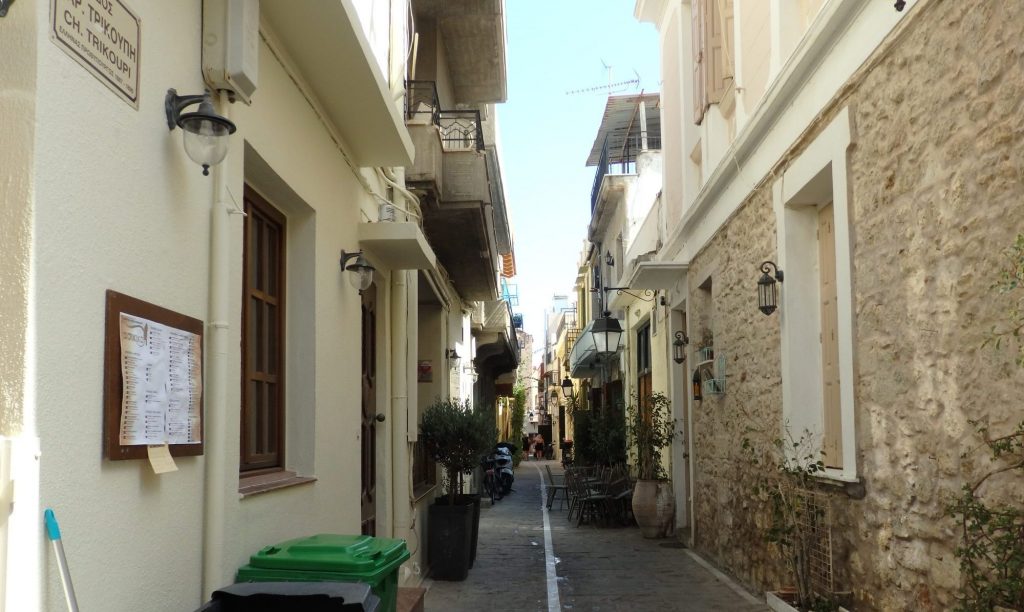
Disclosure: This article contains affiliate links. Making a purchase through an affiliate link will mean a small commission for this website. This will not affect your price. Privacy policy.
Rather than linger, however, I decided to explore the Fortress (Fortezza) of Rethymnon, whose walls still surround a point above the city.
Book your accommodations in Rethymnon.
The Fortezza of Rethymnon
Dating from the 16th century, the Venetians built the Fortress of Rethymnon for defensive purposes. When the Turks took over in 1646 (I guess the defense didn’t go so well!), they continued to use it and added buildings inside. Unfortunately, most of the buildings were destroyed in the 1960s, though a few have been restored since then. This makes for a rather barren, empty feel once you’re inside the walls.
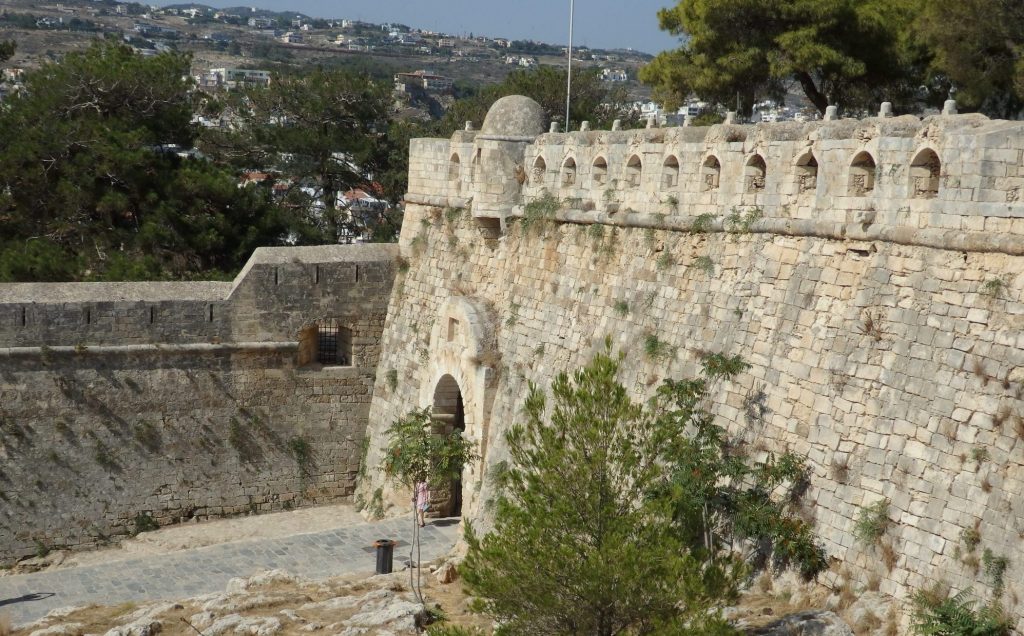
Entering the gate and paying admission, you are free to wander around inside the fortress at will. Most people follow along the walls, peering through gun slits at the views of the city and the Mediterranean Sea. As the day heated up, I welcomed the occasional blasts of wind from the ocean at each opening.
Following the walls, you’ll come upon little sentry posts in each corner of the bastion, where soldiers could keep an eye out for threats, and shoot through the slits if necessary. You’ll see some ruined powder magazines as well as the remnants of the Western Gate. A number of buildings still stand, including the House of the Councillors, home to a conservation laboratory. The Armoury, the Residence of the Rector and the Complex of Magazines at the Northern Gate are all 16th-century constructions.
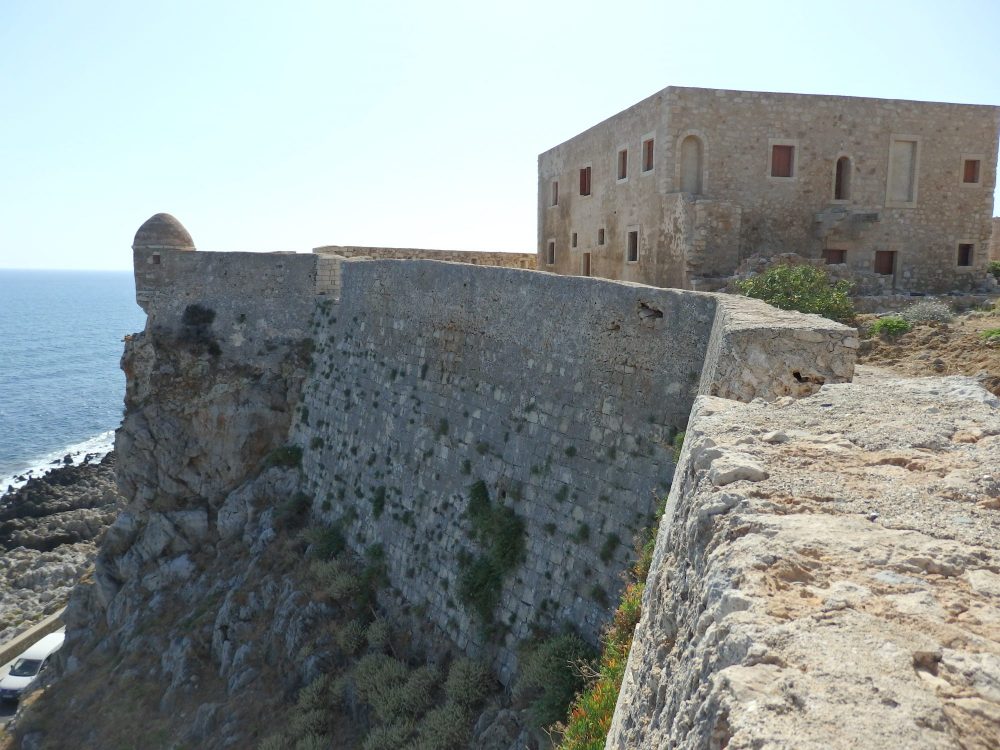
The most imposing building in the collection is the domed Mosque of Sultan Ibrahim Han, which stands in the middle of the fortress. After they captured Rethymnon in 1646, the Turks built the mosque on the site of a Catholic church. Today musical events take place there.
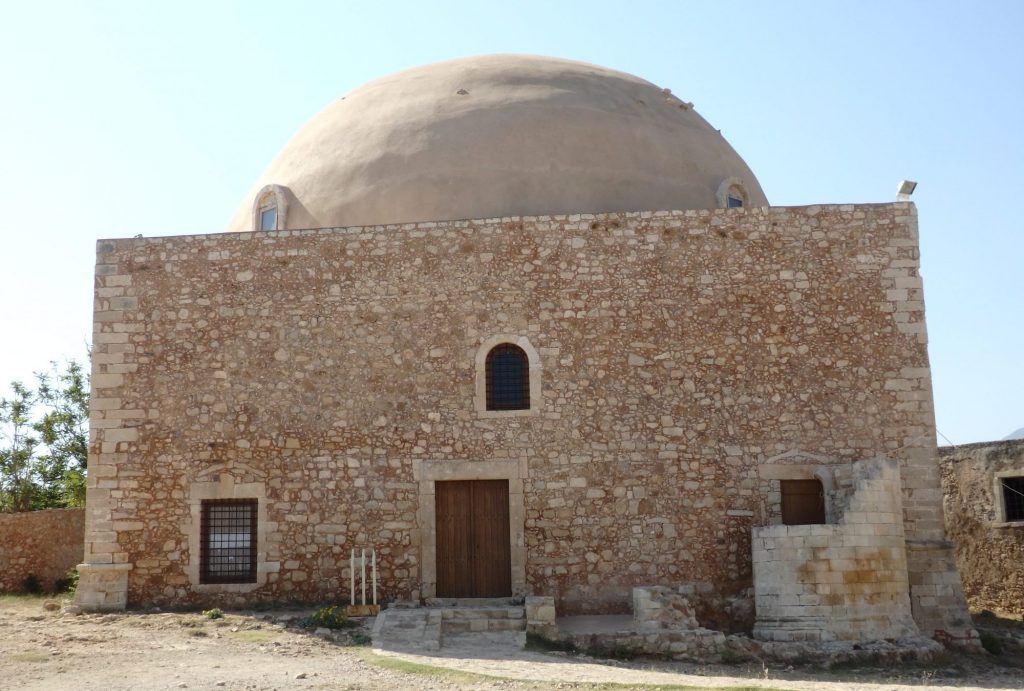
Back down into Rethymnon
There are plenty of other things to see in Rethymnon besides the fortress, if you have more time than I did. I would have liked to see the small archeology museum in the old town. The folklore and history museum, I would imagine, would be one of those obscure sites I particularly enjoy.
I did manage a quick stop at the 15th-century Neratze Mosque, now used for concerts and music lessons. Originally a Venetian church, the Turks turned it into a mosque with the addition of a minaret and three domes after they conquered Crete. The minaret has been beautifully restored.

I passed the Venetian Loggia as well. This well-preserved 16th-century building now houses a Ministry of Culture shop, where you can buy guidebooks and copies of Greek sculptures.
If you’re planning an island-hopping trip, or you just need to get from Athens to Crete, book your ferry rides ahead of time, especially in the busy season. And if you’ll be driving around Crete, compare rental car prices here.
Rimondi Fountain
A friend told me not to miss the Rimondi fountain if I explored Rethymnon. When I found it, I knew what he meant; it’s easy to overlook, surrounded as it is by shops and cafés. In the 16th century, the Venetians built a stone conduit from a spring a couple of kilometers away, and installed this little fountain in town because of a water shortage. You can still see the remnants of a vault that the Turks built over the fountain later.
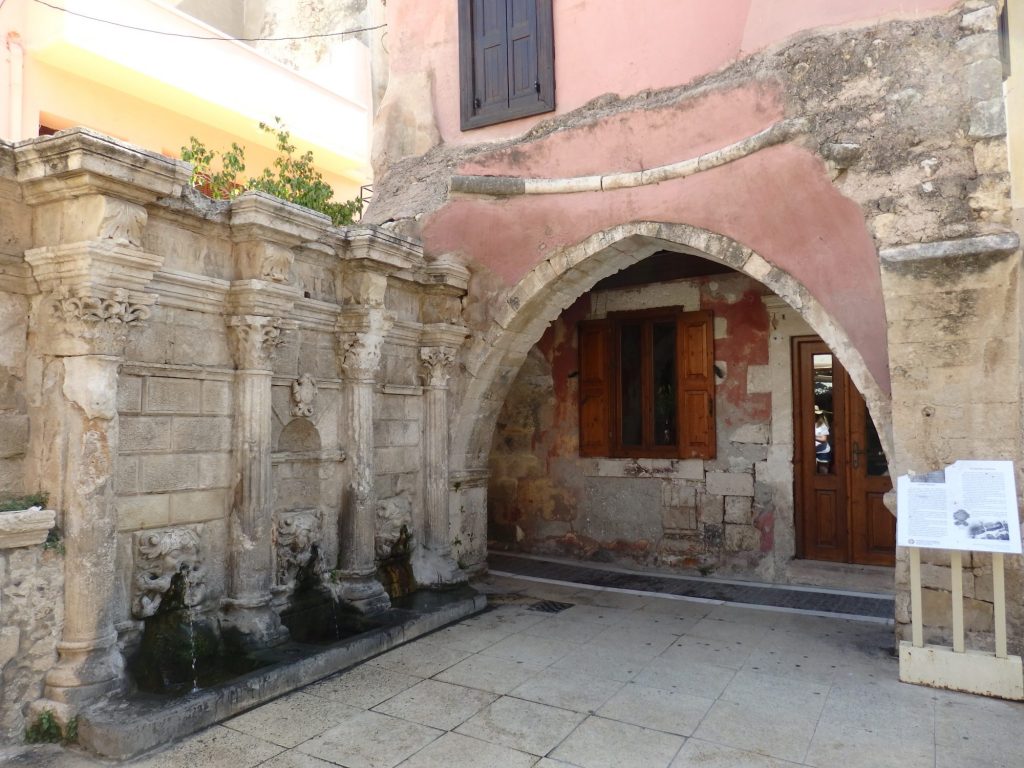
Have you been to Rethymnon in Crete? What did you see and do there? Add a comment below!
My travel recommendations
Planning travel
- Skyscanner is where I always start my flight searches.
- Booking.com is the company I use most for finding accommodations. If you prefer, Expedia offers more or less the same.
- Discover Cars offers an easy way to compare prices from all of the major car-rental companies in one place.
- Use Viator or GetYourGuide to find walking tours, day tours, airport pickups, city cards, tickets and whatever else you need at your destination.
- Bookmundi is great when you’re looking for a longer tour of a few days to a few weeks, private or with a group, pretty much anywhere in the world. Lots of different tour companies list their tours here, so you can comparison shop.
- GetTransfer is the place to book your airport-to-hotel transfers (and vice-versa). It’s so reassuring to have this all set up and paid for ahead of time, rather than having to make decisions after a long, tiring flight!
- Buy a GoCity Pass when you’re planning to do a lot of sightseeing on a city trip. It can save you a lot on admissions to museums and other attractions in big cities like New York and Amsterdam.
- Ferryhopper is a convenient way to book ferries ahead of time. They cover ferry bookings in 33 different countries at last count.
Other travel-related items
- It’s really awkward to have to rely on WIFI when you travel overseas. I’ve tried several e-sim cards, and GigSky’s e-sim was the one that was easiest to activate and use. You buy it through their app and activate it when you need it. Use the code RACHEL10 to get a 10% discount!
- Another option I just recently tried for the first time is a portable wifi modem by WifiCandy. It supports up to 8 devices and you just carry it along in your pocket or bag! If you’re traveling with a family or group, it might end up cheaper to use than an e-sim. Use the code RACHELSRUMINATIONS for a 10% discount.
- I’m a fan of SCOTTeVEST’s jackets and vests because when I wear one, I don’t have to carry a handbag. I feel like all my stuff is safer when I travel because it’s in inside pockets close to my body.
- I use ExpressVPN on my phone and laptop when I travel. It keeps me safe from hackers when I use public or hotel wifi.



I’ve not heard of heard of Rethymnon, let alone visited it! Love the Rimondi fountains and the Turkish influence.
Neither had I! But Crete is definitely worth a visit. I love pretty much any Greek island!
I am a history fan, so, I would have chosen to visit the fortress during a visit. The islands of the Mediterranean are so interesting and scenic. Would not mind spending some time hopping around.
Me too!
Hi Rachel! What a great find! I would love to attend a concert in the mosque. The Rimondi Fountain is gorgeous, too. Reminds me of something that belongs in a fairy tale! Thanks for co-hosting this week. #TPThursday
Yes, I bet the acoustics would be great in the mosque.